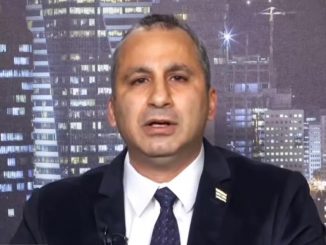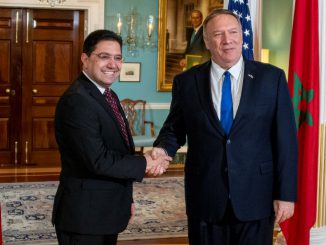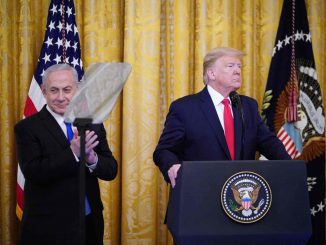
Benjamin Netanyahu gave Israel a place among the nations in a new Middle East
This vision began to be realised in the Middle East as well, when Israel and the United Arab Emirates announced normalisation on 13 August 2020.
Two major works envisaging a better future for Israel were published in 1993:
The New Middle East, by then Foreign Minister Shimon Peres, and A Place Among the Nations , by then opposition leader Benjamin Netanyahu.
Both saw a future in which Israel would have relations with many more nations of the world than it did at the time, just as the Oslo peace process was beginning, but they had a deep disagreement about how they thought this would happen.
Shimon Peres wrote his book after the summit of the Oslo Accords, which in his view reshaped the region for the better, while Netanyahu named his chapter on the Accords “Trojan Horse”, believing it to be a danger to Israel.
“At the heart of the conflict that has been going on for about 100 years”, wrote Shimon Peres, “a conflict that intensified with the founding of the State of Israel 45 years ago, is the Palestinian question”.
“If Israel makes peace with the Palestinians, then the rest of the Arab world will follow and “pave the way for a fundamental transformation”, creating the new Middle East,” he said.
Shimon Peres remained on this position for the rest of his life, even negotiating with the President of the Palestinian Authority Mahmoud Abbas when he was President of Israel and Netanyahu was Prime Minister. It was a vision that made him an international superstar.
It had a lot of support, from politicians around the world and experts in their think tanks. The Arab Peace Plan of 2002 was based on the very idea that the Arab League states would only have official relations with Israel if there was a two-state solution.
Netanyahu, however, had and still has a fundamentally different vision of what would make Israel a country worth making peace with. His last speech as Leader of the Opposition in 1996 summed up his views on how he thinks the “new Middle East” will become, as described in his book.
“We can achieve a glorious future for the State of Israel … We have very sophisticated industries and very sophisticated people. People coming from the army, the air force, intelligence, can operate in the new media systems, in computer communications, information security, all these elements of the new knowledge industry. We are on the verge of becoming one of the truly prosperous economies, if we achieve the liberalisation we believe in. If we take these steps, the economic power of the State of Israel will be among the top 15 economies in the world,” Netanyahu said.
The way for Israel to make this progress in “the real Middle East”, as opposed to the new Middle East, he said, “is not to tear down the walls, our defensive walls … but to fortify them – economically, socially, in terms of aliyah, in terms of settlement.
In the 27 years since the publication of these books, Israel has repeatedly entered into negotiations with the Palestinians and offered major concessions, which the Palestinians have always rejected. The Palestinian leadership has refused to negotiate with Israel in recent years.
But for 14 of those 27 years, Netanyahu was Prime Minister, so it is not surprising that Israel pursued the vision of Israel’s place among the nations.
Israel’s economic development and the promotion of its innovative spirit have led to strong partnerships with countries around the world, particularly over the past decade.
And from 13 August, this vision began to be realised in the Middle East as well, when Israel and the United Arab Emirates announced normalisation.
In Abu DHABI with the large Israeli delegation meeting Emirati officials, who arrived on the very first flight of an Israeli commercial airline to the UAE, which was also on the very first Israeli flight over Saudi Arabia, it seemed that something important was happening .
It was clearly not only the Israelis who were enthusiastic about this new development. The Emirates did everything they could. They literally rolled out the red carpet for the El Al aircraft that landed at Abu Dhabi airport. They organised a banquet with steaks and caviar for officials from both governments.
The journalists were treated to a private tour of the futuristic-looking Louvre Abu Dhabi and served a four-course dinner, including the delicacy of camel meat. (There was also a kosher option, offered by the newly certified local kosher caterer OU.)
Local participants included such personalities as the minister of culture, the head of the UAE Mars mission and a member of parliament leading an anti-extremism effort. as well as Emirati journalists.
The group, of course, was carefully selected to make a certain impression on the journalists who would then take the messages back from the UAE to Israel. But there was still a lot to glean from spontaneous and frank conversations with people whose expertise was not necessarily in foreign relations.
We heard from people who had Israeli friends who had studied in the United States and Europe. We answered questions about sights to visit when they finally arrive in Israel. People were interested in cooperation in technology and other research. One official compared the ambitious minds of the Israelis and the Emirates.
Don’t compare this peace to the one Israel has with Jordan and Egypt,” said one official. It is peace between two peoples who want to know each other.
The fact that the younger generation in the Middle East has much to gain from abandoning extremism and strengthening ties with Israel was a theme that came up repeatedly.
At no time during the trip was the subject of the Palestinians raised.
In the file, the response was that “one of the preconditions for the start of bilateral relations was the cessation of annexation,” and the UAE has “assurances from key U.S. and Israeli leaders” on this subject, as Foreign Ministry Director of Policy Planning Jamal al-Musharakh said in a briefing Tuesday, just before the return flight to Israel.
The UAE “remains with the Arab consensus and resolutions concerning [the Palestinians]. We haven’t even gone one inch back from our position,” he said.
But when asked whether the normalisation process would stop if Israel went ahead with sovereignty plans, Musharakh replied “it won’t”.
Other officials were very dissatisfied with the Palestinian reaction to the normalisation of the UAE with Israel. One of the dinner participants said that the UAE should do things in its own interest and not listen to the dictates of others. Ties with Israel do not concern the Palestinians because they have existed for years, she stressed.
Daniel Estrin of NPR had a similar impression, writing that “the Emiratis were offended by what they perceived as Palestinian insults to their leader. In recent weeks several Emiratis have privately expressed to the NPR their contempt for the Palestinian leadership”.
It would be naive to say that everything is perfect and exactly how Israel would like things to be.
The hotel in which the Israeli delegation stayed in Abu Dhabi was overflowing with Israeli and Emirati security, and the coronavirus was not the only reason why Israelis were strongly discouraged from exploring the city on their own.
The Emiratis may seem enthusiastic about peace with Israel, but they represent only about 15% of the UAE’s population; it is better to be cautious than sorry.
Standard links will not include visa-free access any time soon, due to Israeli security concerns. A senior Israeli official on the trip said that Emiratis seeking to come to Jerusalem and pray at al-Aqsa are likely to have a shorter wait than Egyptians and Jordanians.
The Israeli embassy in the UAE is also less likely to be in a large independent luxury building like some of the other countries, as a unit in an office building is easier and cheaper to secure.
And, of course, the UAE is only one country, however advanced and influential it may be. The response from the rest of the region is decidedly mixed.
No one expected anything different from Iranian leader Ayatollah Ali Khamenei, who called normalization with Israel a “betrayal” and said that “the Emirati people will be disgraced forever“.
Senior White House adviser Jared Kushner, who took the historic Tel Aviv-Abu Dhabi flight, continued on to Bahrain and Saudi Arabia after the United Arab Emirates.
In Manama, King Hamad bin Isa Al Khalifa told Kushner that regional stability depended on Saudi Arabia, the official Bahrain news agency said.
It was a signal that Bahrainis are not about to formalise their relations with Israel until the Saudis do so. He also stressed “efforts to achieve a just and comprehensive solution that guarantees the legitimate rights of the Palestinian people and a lasting peace in the region”.
In Neom, in northwestern Saudi Arabia, Saudi Crown Prince Mohammed ben Salmane and Kushner on Tuesday spoke of “the need to resume negotiations between the Palestinian and Israeli sides to achieve a just and lasting peace”.
But the next day, Saudi Arabia announced that it was “allowing the passage of the kingdom’s airspace for flights to and from the UAE to all countries“, as its Foreign Minister Faisal bin Farhan wrote, although he also specified that this did not mark a change in his position towards the Palestinians.
It was, as Netanyahu said in a statement shortly afterwards, a “tremendous breakthrough”.
“These are the benefits of genuine peace,” he said. “There will be much more good news to come.”
Netanyahu also met Wednesday with Egyptian President Abdel Fatah al-Sissi. Sissi not only welcomed the development of open relations between Israel and the United Arab Emirates and called for “preserving the legitimate rights of the Palestinian people,” but said that “movements towards peace in the region should ‘ensure the security of Israel,
The conversation with Sissi is also a reminder of how far we have come since Israel had its first peace treaty with an Arab state, Egypt, in 1977. Unlike Egypt, the UAE does not consider Israel to be a pariah.
Saudi Arabia even facilitates peace between Israel and the UAE in a way by allowing flights between the countries to last about half the time they would otherwise have.
It took 17 years between Israel’s first two peace treaties with Arab countries, the second being Jordan, and another 26 years until the UAE became the third.
It may take a long time for Israel to be recognised by the 22 Arab states, as Kushner predicted this week. History doesn’t have a steady rhythm; it progresses in unpredictable surges and stops.
But we can say with certainty that what we have seen in recent weeks was not the new Middle East, with the Palestinians holding the keys to the future of Israel.
It is a new Middle East in which Israel has a place among the nations. It was Israel that made peace mainly because of what Israel has to offer, and what Israel will continue to offer to countries that really want relationships.




Be the first to comment